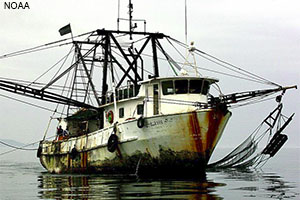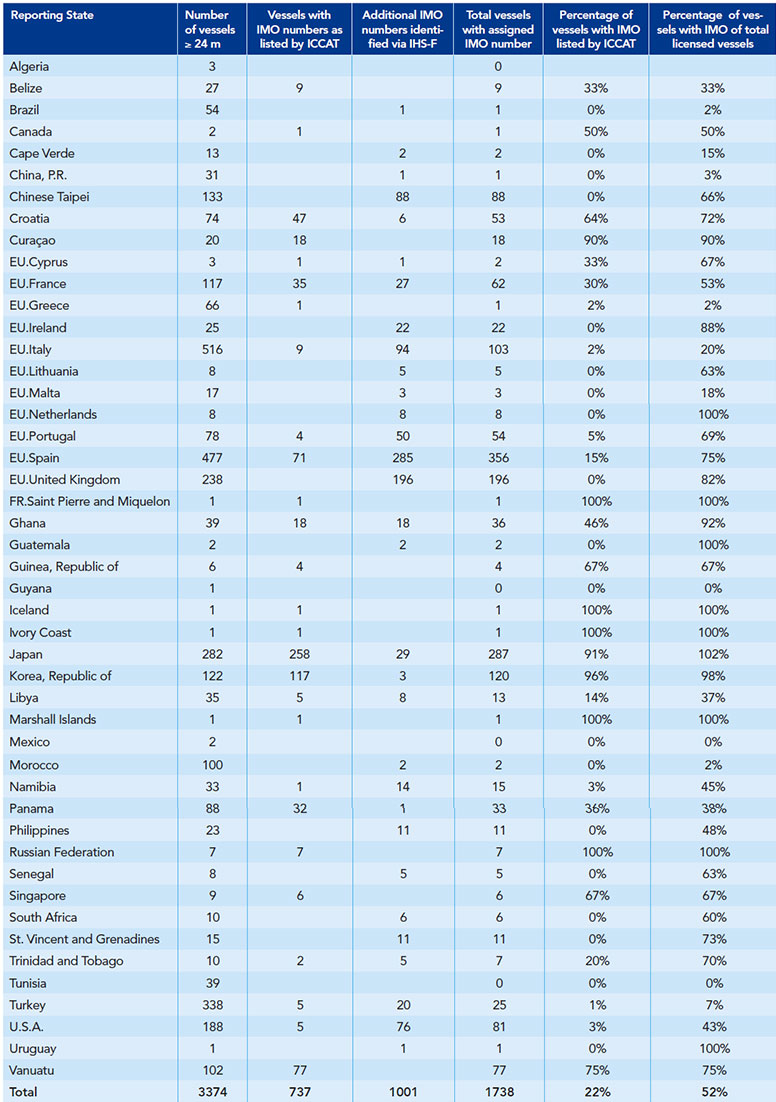Guess Who is Coming to Port Today?
Act now to Stop Illegal Fishing
Mandate that ICCAT vessels have an International Maritime Organization number
At the 12-19 November, 2012, meeting of the International Commission for the Conservation of Atlantic Tunas, ICCAT, Contracting Parties (CPCs) are in a position to stop illegal fishing, promote effective fisheries management, and improve safety of vessels at sea. Mandating an International Maritime Organization (IMO) number will enable positive identification of vessels and is a key step in the fight against illegal fishing.
 The Problem
The Problem
Unlike merchant vessels, automobiles, and even smartphones, commercial fishing vessels are exempt from the requirement to have unique identifying numbers that remain with the vessel from construction to scrapping. While fishing vessels do have names, call signs and other identifiers, none of these are permanent and can be changed by the vessel owner quickly and easily. In addition, such vessel identifiers are not systematically included in relevant vessel records and communications.
How an International Maritime Organization (IMO) Number Would Help
The use of IMO numbers allows authorities and fisheries managers to monitor, with confidence, vessel activity at sea and in port. By requiring IMO numbers, which are unique and permanent, RFMOs and flag States will take a significant step towards preventing fraud, ensuring the safety and security of fishing operations and leveling the playing field for law-abiding fishermen.
Tracking Vessels in ICCAT, A Closer Look
From a preliminary review of ICCAT records of vessels 24 metres or longer (Table 1), we have identified:
- vessels on the ICCAT licensed list that have sunk
- vessels listed twice under different names and flags
- vessels listed with incorrect IMO numbers
- multiple vessels listed with the same call sign
- the same vessel listed under different reporting flags with different tonnage and length information
- discrepancies in the vessel tonnage information between the ICCAT vessel record and the IMO numbering system (IHS Fairplay, which is based on national registries or vessel owner information)
- vessels that go under different names and with different identifying features in the licensed vessel lists of different ICCAT member States.
Mandatory IMO numbers and a proven, cross-checked database will allow ICCAT and its members to better identify, correctly license and more effectively manage vessels and their owners.
Why An IMO Number Is The Best Unique Vessel Identifier
The IMO number scheme was introduced in 1987 to enhance maritime safety, prevent pollution and curtail maritime fraud. The scheme is already established as a reliable and recognised UVI for the global merchant fleet, with a proven track record due to the credible and cross-checked database that supports it.
There is increasing international support for the need for a global system for identifying fishing vessels, as well as recognition that this system needs to be based on the IMO number scheme currently provided by IHS Fairplay (previously Lloyd's register).
The Kobe meetings of the tuna RFMOs (since 2007), the Workshops on the Consolidated List of Authorized Vessels of Tuna Regional Fisheries Management Organizations (CLAV, 2011 & 2012) and the Food and Agriculture Organization of the United Nations (2010, 2012) have concluded that the IMO number system is the best available for ensuring that fishing vessels can be easily and quickly identified. In 2011, the Commission for the Conservation of Antarctic Marine Living Resources (CCAMLR) required that all vessels authorised to fish toothfish have an IMO number.
What ICCAT Can Do
ICCAT was one of the first RFMOs to require the inclusion of the IMO number, where available, in its list of licensed vessels – but use of the IMO number is still not mandatory. As of November 2012, there are 3,374 entries of vessels 24 metres or longer in the ICCAT record of vessels3. Of these, 737 are listed with their IMO numbers, while an additional 1,001 vessels that already have IMO numbers (identified with an IMO number from IHS Fairplay's record), do not have their IMO number included as part of the ICCAT vessel record.
This means that by using this unique identifier ICCAT already has the capacity to record 52 percent of the vessels (1,738 vessels) 24m or longer that are listed on its records.
At this 2012 meeting ICCAT should:
- ensure that CPCs effectively implement the mandate to report a vessel's IMO number by submitting all the information required under Recommendation 11-12 and 10-04 before the end of 2012; and to regularly update information on authorised vessels, as required, so that the Executive Secretary can duly ensure that the records are publicly available in real time;
- require that, as a first step, all bluefin tuna vessels authorised to fish or operate in the Convention Area that are 20 metres in length or greater, or fish outside the EEZ of their flag State, have an IMO number, and that this number is reported as part of the records of ICCAT vessels authorised to fish bluefin tuna.







